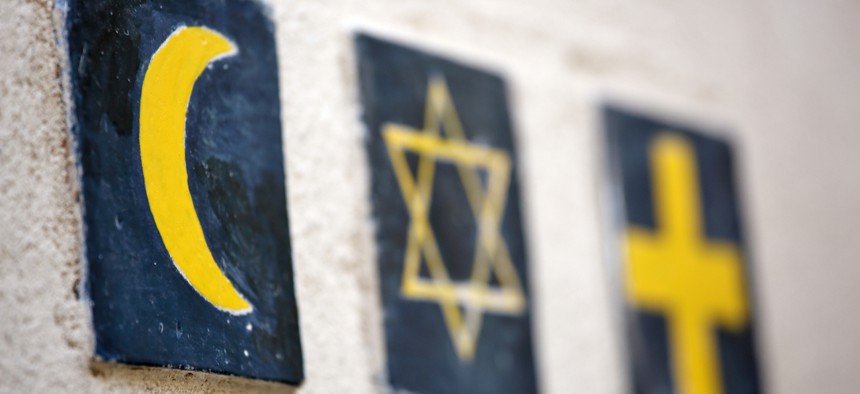
Shutterstock.com
Citing New Supreme Court Ruling, VA to Allow Religious Displays at Hospitals and Facilities
VA says its new policy will 'protect religious freedom,' though some feel it violates the Constitution.
The Veterans Affairs Department is now allowing its vast network of hospitals and other facilities to display religious symbols in a move its chief said would help ensure compliance with the First Amendment of the Counstituion.
Existing policy, according to VA, has created “unfortunate incidents” such as Christmas trees and carollers being banned at various facilities. The new guidance will “bring simplicity and clarity” to religious policies across VA’s network, the department said, and “promote religious liberty” for veterans.
The policy applies to any public space, such as lobbies and grounds, and to any “text, material object, emblem or image that is representative of a religious or spiritual belief.” It allows for symbols and displays on walls, tables, structures and as required for holidays. The displays should “recognize the important role that religion plays in the lives of many Americans.”
“We want to make sure that all of our veterans and their families feel welcome at VA, no matter their religious beliefs,” said VA Secretary Robert Wilkie. “Protecting religious liberty is a key part of how we accomplish that goal.”
While the examples VA provided of “unfortunate incidents” all involved Christian-based displays, VA was careful to note that no one religion should be given preferential treatment over another. The policy, which went into effect Wednesday, tasked the head of each VA facility with to create a local committee “representing diverse faith traditions” to determine appropriate displays in consultation with outside groups. The displays “should respect and tolerate differing views and should not elevate one belief system over others,” VA said.
VA’s National Chaplain Center oversees spiritual leaders at all department health care facilities, but the new public display policy does not affect their work. Facility leaders are expected to consult with the head of the chaplain service, as well as the Office of General Counsel and the Office of Diversity and Inclusion, if any issues arise. VA also instructed the National Chaplain Center to advise local leaders on the significance of symbols and practices of various faith groups.
The policy allows patients at VA facilities to request and receive various religious texts and symbols while in VA care. The department can also now accept donations that include religious symbolism or text—such as cards that say “Merry Christmas”—and distribute them “under appropriate circumstances.”
In announcing the policy, VA cited The American Legion v. American Humanist Association, a case in which the Supreme Court ruled last month that a large cross on public land in Bladensburg, Maryland, could remain on display. The court said in a 7-2 decision that the cross, originally constructed as a World War I memorial, had stood for more than 90 years without disturbance and had come to represent more than just a religious element.
Richard B. Katskee, legal director for Americans United for Separation of Church and State, said the Trump administration was contorting the court’s decision to “justify the government putting up new religious displays.”
“The Supreme Court’s Bladensburg Cross decision did not change our country’s fundamental premise of church-state separation: The Constitution states that the government cannot favor certain religious beliefs over others, or favor religion over nonreligion,” Katskee said. “The government should allow residents of VA facilities to practice their faith as they choose; it should not coerce a captive audience of veterans and their families to observe the beliefs of the government’s choosing.
He added the timing of the announcement was particularly problematic.
“It’s distressing that the Trump administration would choose Independence Day, a holiday to celebrate our country’s freedoms and our veterans, to roll out a policy that dishonors both,” Katskee said.
Wilkie, for his part, said the new policy would ensure VA is “consistently complying with the First Amendment to the U.S.Constitution at thousands of facilities across the department.” VA added that the Bladensburg Cross case “reaffirmed the important role religion plays in the lives of many Americans and its consistency with Constitutional principles.”







